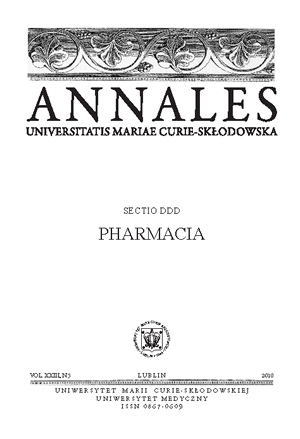Effect of pro-inflammatory cytokine-mediated mechanism on quality of gastrointestinal restitutio ad integrum
Keywords:
esophageal mucosa, melatonin, ulcerAbstract
We studied the morphofunctional changes in esophageal mucosa after the experimental injury by acid-pepsin perfusion and stress inducted injury with and without melatonin treatment. Melatonin-treatment enhanced epithelial proliferation and accelerated the healing activity of the esophageus tissue. Melatonin, a perspective and potent anti-inflammatory agent, can be used with antiulceric and healing scope.
References
1. Baatar D., et al.: Esophageal ulceration triggers expression of hypoxia-inducible factor 1 and activates vascular endothelial growth factor gene: implications for angiogenesis and ulcer healing. Am. J. Pathol., 161, 1449, 2002.
2. Bubenik G.A.: Therapeutic perspectives of gastrointestinal melatonin. Melatonin: from molecules to therapy. Eds: R.S. Pandi-Perumal, D.P. Cardinali, Nova Publishers 2006.
3. Carrillo-Vico A., Guerrero J.M., Lardone P.J., Reiter R.J.: A review of the multiple actions of melatonin on the immune system. Endocrinology, 27, 189, 2005.
4. De Filippis D., et al.: Melatonin reverses lipopolysaccharide-induced gastro-intestinal motility disturbances through the inhibition of oxidative stress. J. Pineal. Res., 44, 45, 2008.
5. Erren T.C., Reiter R.J.: Light Hygiene: Time to make preventive use of insights--old and new--into the nexus of the drug light, melatonin, clocks, chronodisruption and public health. Med. Hypoth., 73, 537, 2009.
6. Konturek S.J., Zayachkivska O.S., Brzozowski T. et al.: Protective influence of melatonin against acute esophageal lesions involves prostaglandins, nitric oxide and sensory nerves. J. Physiol. Pharmacol., 58, 371, 2007.
7. Konturek S.J., Konturek P.C., Brzozowska I., Pawlik M.: Localization and biological activities of melatonin in intact and diseased gastrointestinal tract (GIT). J. Physiol. Pharmacol., 58, 381, 2007.
8. Mayo J.C., Sainz R.M., Tan D.X., et al.: Anti-inflammatory actions of melatonin and its metabolites, N1-acetyl-N2-formyl-5-methoxykynuramine (AFMK) and N1-acetyl-5-methoxykynuramine (AMK) in macrophages. J. Neuroimmunol., 165, 39, 2005.
9. Motilva V., Cabeza J., Alarcon de la Lastra C.: New issues about melatonin and its effect on the digestive system. Curr. Pharmaceut. Design., 7, 909, 2001.
10. Perianayagam M.C., Oxenkrug G.F., Jaber B.L.: Immune-modulating effects of melatonin, N-acetylserotonin, and N-acetyldopamine. Ann. N.Y. Acad. Sci., 1053, 386, 2005.
11. Zayachkivska O., Gzhegotsky M., Yaschenko A. et al.: Effects of nitrosative stress and reactive oxygen-scavenging systems (ROSS) in esophageal physiopathy under streptozotocin-induced experimental hyperglycemia. J. Physiol. Pharmacol., 59, 77, 2008.
Downloads
Published
Issue
Section
License
Copyright (c) 2010 Authors

This work is licensed under a Creative Commons Attribution-NonCommercial-NoDerivatives 3.0 Unported License.


